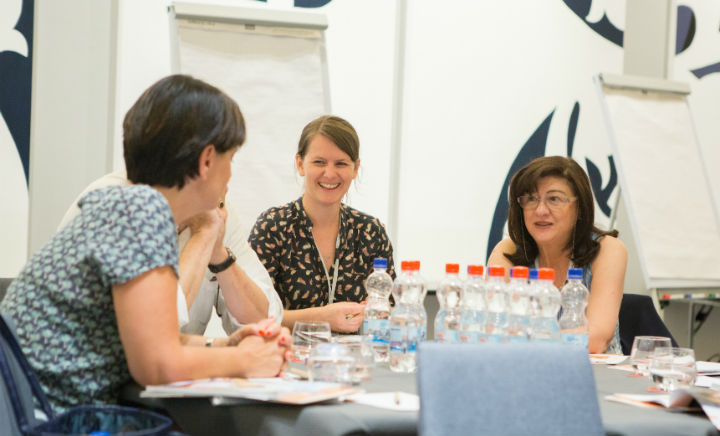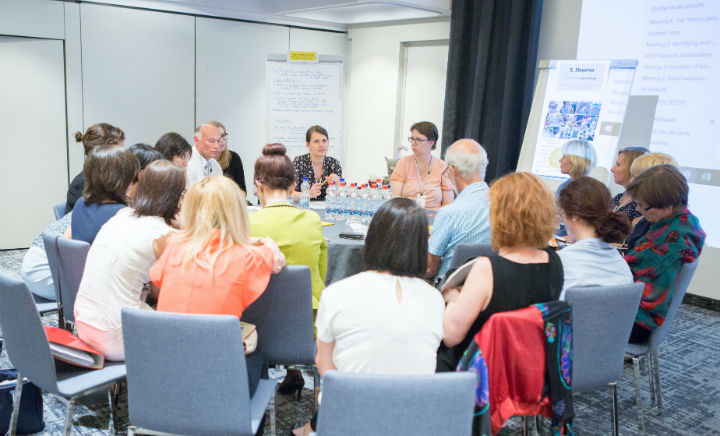Sixth FEAD European Network Meeting: the “whole person approach”

On Monday 19 June, the Red Cross participated in the 6th European Network Meeting of the Fund for European Aid to the most Deprived (FEAD) in Brussels.
The meeting brought together implementing organisations and managing authorities working to reduce the worst forms of poverty in European countries. Attended by over 80 people, including delegates from the Slovenian Red Cross, Bulgarian Red Cross, French Red Cross and German Red Cross, the event was an opportunity to share best practices and strategies around the theme, “Adopting a ‘whole person approach’ in FEAD support activities”. A marketplace session took place, featuring presentations about various initiatives implemented by organisations in the EU to help people deal with the multifaceted consequences of living with deprivation.
Klara Debeljak, Project Manager at the Ljubljana branch of the Slovenian Red Cross, presented the locally-based project she has been developing since 2014, “Srečevalnica” [“Meeting Room”]. The initiative works to support social inclusion, with a special focus on women, aiming to help address material and non-material needs. In 2016, 11,000 people living in Ljubljana received food and material aid through the Ljubljana local branch. Food aid often acts as an entry point to reach vulnerable people. In this project, the Red Cross works to assist with the development of practical skills, for example through sewing workshops and urban community gardening. “I believe that putting the concept of a ‘whole person’ approach into action takes extra energy, but it is fundamental for providing efficient support to people in need,” she explained.
Ms Debeljak emphasised the importance of building relationships with project participants to find out their interests and needs, so as to tailor services and provide appropriate assistance. During the first phase of the venture, the Red Cross trialled which formats of support were most effective. It became apparent that one barrier to inclusion occurred when parents could not attend activities because they had no babysitter. Taking this into consideration, a children's programme has been designed to overcome this barrier.
Project activities are run by volunteers, and recipients often become engaged in organising events too. In return, the Red Cross provides training. “Everyone can contribute. People can be involved in the events from beginning to end,” Ms Debeljak highlighted.

Another case study on “Combining food distribution with counselling and information provision” was presented by Bozhidar Sandev from the Agency for Social Assistance in Bulgaria. Mr Sandev has been working towards the provision of social services for vulnerable groups under the European Social Fund (ESF), and is currently responsible for the implementation of FEAD activities in Sofia. In Bulgaria, the Red Cross is the implementing partner for FEAD. Considering people’s needs from a holistic perspective, “there are generally a range of social issues barring deprived individuals from inclusion into multiple parts of social life,” Mr Sandev emphasised.
Representatives of Caritas and the FEAD Managing Authority in Slovakia highlighted the “whole person approach” in their activities implemented under FEAD, focusing on “Linking FEAD end recipients to social workers”. They described how assistance is organised through a network of social workers, including from the Slovak Red Cross. Trained staff provide information and advice on a range of issues according to needs. The high numbers of people returning to receive additional assistance from this service reflects the efficacy of such an approach.
“Exchanging examples of good practices is one step towards improving our work, so I really appreciated the opportunity to discuss such an important topic with fellow colleges from all of the Europe,” said Ms Debeljak. The meeting between different stakeholders was particularly valuable in light of the fact that implementing a “whole person” approach requires solid cooperation between agencies, and the provision of integrated services. Coordination can help to simultaneously address multiple underlying issues faced by vulnerable populations, improve access to services by the most vulnerable, and prevent duplicated interventions, increasing cost-effectiveness.
This meeting was part of an ongoing series organised by the European Commission, in parallel to the implementation of FEAD in the 28 EU Member States.
Download the meeting reports:
Sixth European Commission meeting report
Fourth European Commission meeting report
Third European Commission meeting report
Second European Commission meeting report
First European Commission meeting report
If you are interested in joining the community, please contact Eberhard Lueder.
For media inquiries, please contact Eva Oyón on: eva.oyon@redcross.eu or +32 2 235 09 22

